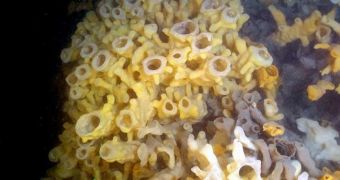Global warming and climate change are reshaping biodiversity, not just in areas populated by hundreds of plant and animal species, but also in regions where environmental conditions are so harsh that few species manage to survive and thrive.
Scientists writing in the journal Current Biology detail how, after spending some time studying Antarctic ecosystems, they concluded that local glass sponges had benefited greatly from the melting of a local ice sheet.
They say that these marine creatures are now thriving in a portion of the sea floor that used to be permanently covered by ice.
Interestingly enough, this sudden and unexpected boom in the glass sponges' population came at the expense of one other species whose representatives used to inhabit this portion of the Antarctic sea floor in rather large numbers.
“Only four years ago, the study area was dominated by a species of sea squirt. Now this pioneer species has all but disappeared, giving way to a community dominated by young individuals of a glass sponge,” researcher Laura Fillinger says.
“A general principle to be learned from our study is that benthic communities are very dynamic, even under the extreme environmental conditions prevailing in the Antarctic,” she further argues. Science News reports that, with the help of remotely operated underwater vehicles, Laura Fillinger and her fellow researchers were able to monitor the evolution of this community of glass sponges.
In just a few years' time, their population tripled. What's odd is that these marine creatures have been documented to lead very slow lives and really take their time when it comes to trying to set up camp in new areas.
Therefore, this boom is their population is considered by many a bit unnatural.
Specialists are unable to say how this boost in the glass sponges' population will affect natural ecosystems in the Antarctic.
However, they agree that, “If the alarming rate of ice shelf disintegration continues, glass sponges may find themselves on the winners' side of climate change.”

 14 DAY TRIAL //
14 DAY TRIAL //